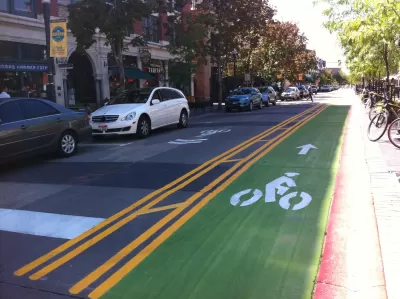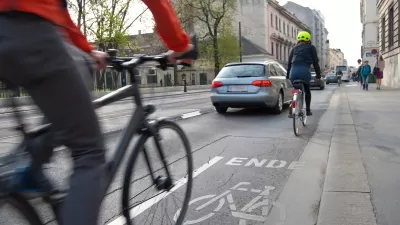A common refrain among politicians who oppose bike infrastructure investments is that people who bike don't pay for those projects. What's a bike advocate to do?

Dave Cieslewicz, of the Bike Federation of Wisconsin, explains how he responds to a fairly standard question posed to bike advocates: Why don’t cyclists want to pay for their own bike lanes?
As Cieslewicz notes, the idea to tax bike riders goes beyond idle musings. A few years ago the state of Wisconsin considered a budget amendment that "would have imposed a $25 'registration fee' on every new adult-sized bike purchase in the state." Thus, the question requires a good answer. Here, Cieslewicz provides his standard response to the line of inquiry:
…most cyclists are also drivers, so we do pay gas taxes and vehicle registration fees that go to fund roads, including bike lanes, paved shoulders and the like. When we ride state trails – and some local ones – we pay for trail passes. And then there’s the savings in wear and tear on the roads, the lessened need for expensive car parking, the reduction in pollutants and green house gas emissions and the personal health benefits that end up saving everybody money in the long run.
Cieslewicz realizes, however, that his standard inquiry can't defeat the "intellectual Teflon" of the political opposition. One idea that failed to achieve adoption was voluntary bike registration. In this post, Cieslewicz offers another idea: "expanded use of current local registration fee revenues."
FULL STORY: Tax Cyclists for Road Upgrades?

Planetizen Federal Action Tracker
A weekly monitor of how Trump’s orders and actions are impacting planners and planning in America.

Restaurant Patios Were a Pandemic Win — Why Were They so Hard to Keep?
Social distancing requirements and changes in travel patterns prompted cities to pilot new uses for street and sidewalk space. Then it got complicated.

Map: Where Senate Republicans Want to Sell Your Public Lands
For public land advocates, the Senate Republicans’ proposal to sell millions of acres of public land in the West is “the biggest fight of their careers.”

Maui's Vacation Rental Debate Turns Ugly
Verbal attacks, misinformation campaigns and fistfights plague a high-stakes debate to convert thousands of vacation rentals into long-term housing.

San Francisco Suspends Traffic Calming Amidst Record Deaths
Citing “a challenging fiscal landscape,” the city will cease the program on the heels of 42 traffic deaths, including 24 pedestrians.

California Homeless Arrests, Citations Spike After Ruling
An investigation reveals that anti-homeless actions increased up to 500% after Grants Pass v. Johnson — even in cities claiming no policy change.
Urban Design for Planners 1: Software Tools
This six-course series explores essential urban design concepts using open source software and equips planners with the tools they need to participate fully in the urban design process.
Planning for Universal Design
Learn the tools for implementing Universal Design in planning regulations.
Heyer Gruel & Associates PA
JM Goldson LLC
Custer County Colorado
City of Camden Redevelopment Agency
City of Astoria
Transportation Research & Education Center (TREC) at Portland State University
Camden Redevelopment Agency
City of Claremont
Municipality of Princeton (NJ)





























